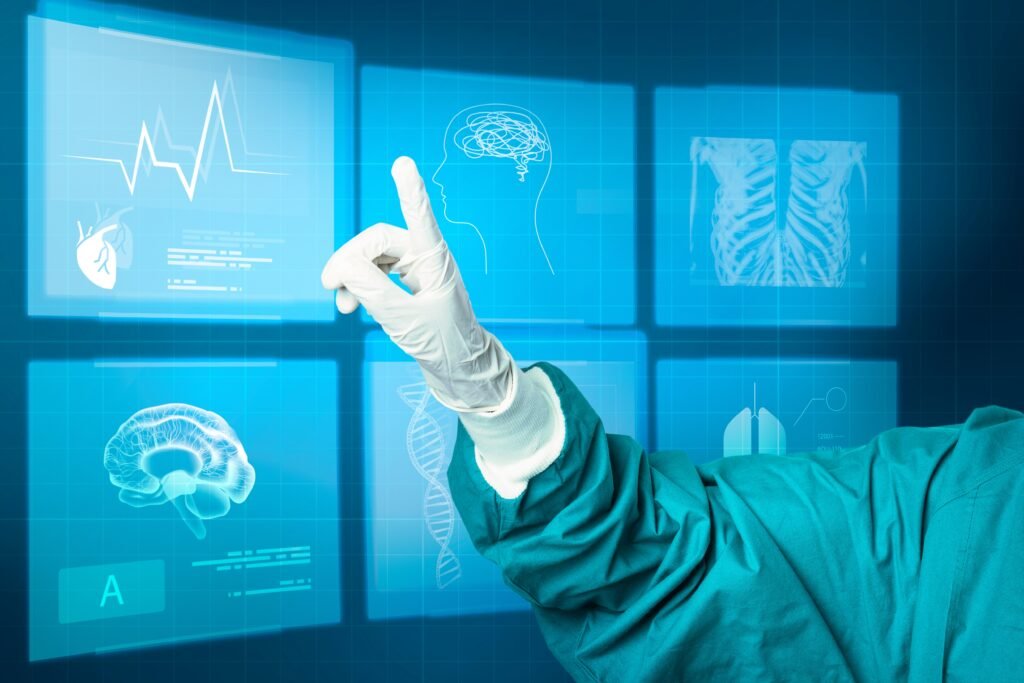Revolutionizing Healthcare
The development of the link between the new technology “Personalized Medicine” and AI in healthcare has become a transformative force. Customized medicine is the medical practice that is the ultimate personalization for each patient by using therapeutic interventions, and the practice of healthcare according to their own genetic, environmental, and lifestyle factors. This sector owes its growth to AI, which remains the cornerstone, as the technology allows for a very high degree of precision and efficiency in treating and diagnosing patients. This article takes a look at the role of AI in personalized medicine, its advantages, and the future of the merging of the two.
What is Personalized Medicine?
Just as an automobile is personally designed for each driver, personalized medicine, otherwise called precision medicine, suggests a new approach to treatment and preventive methods whereby there is an adaptation to the distinctiveness of the personal features. Taking genetics as the base, unlike traditional medicine, which generally prescribes a uniform treatment plan for all patients, personalized healthcare plans integrate genetic, lifestyle, and biographical factors. This type of healthcare plan strives to be personalized as possible in order to improve treatment outcomes, minimize injuries, and enhance the care of a patient in general.
The Role of AI in Personalized Medicine

The applications of machine learning and data analytics, in particular, are the engines driving the personalized medicine revolution. This is how AI is reshaping the field:
➤Genomic Data Analysis
AI’s capacity in reading heavy genomic data is very commendable. With the help of genetics and AI data scientists, a system which is able to articulate mutated genes and biomarkers through the medium of a certain ill condition is manifested. This process produces the complete and concise data needed for further analysis that results in a complete understanding of the genetics of the disease and the development of targeted therapies. For example, AI is used in cancer patients to interpret the genomic sequence and find mutations that can be treated with a particular treatment.
➤Predictive Modeling
The AI-powered predictive models use diverse data sources such as health records on computers, x-ray information, genetic material, and others to predict disease risk and treatment success especially in the case of diabetes. These models identify patients with high risks of developing certain conditions which enables doctors to intervene at an early stage. For example, predictive analytics can help in recognizing people who are at the risk of getting sick from diabetes or heart diseases, giving the option of early intervention as well as personal prevention strategies.
➤Drug Development and Optimization
AI speeds up the process of drug discovery by using large datasets to search for potential drug candidates and predict how they will be in real life. AI technologies will be able to model the interaction of drugs with biological materials, therefore, cutting costs, time, vectors for drug development, and minimizing production through personalized medicine being tailored to patient’s genetic profiles.
➤Treatment Personalization
AI also helps in the creation of treatment plans based on individual patient data. Once the analysis of historical treatment outcomes and patient characteristics is done with the AI, the AI can recommend personalized treatment options that are most likely to be effective. For example, AI algorithms can find the most suitable chemotherapy regimen for a cancer patient based on genetic profiles and previous treatment responses.
➤Precision Diagnostics
AI boosts the diagnostic accuracy when diagnosing through the analysis of medical imaging data and other diagnostic tests. AI-based products are designed to find subtle patterns and anomalies that go unnoticed by humans to carry out earlier and more precise diagnoses. This type of diagnostics is crucial for personalized medicine as it ensures the patient gets an accurate and tailor-made treatment plan.
Benefits of AI in Personalized Medicine
AI adds a lot to personalized medicine by analyzing vast treatments to patients and improves accuracy in diagnostics as well as predicts disease risk based on genetic factors, and optimizes treatment plans for better results. AI help us to reducing trial and error in treatment approaches.

➢Enhanced Treatment Efficacy
AI is capable of treating individual patients effectively by making the therapies we use these days more personalized. Patients who receive the therapies that are best for their unique genetic en profiles will typically have better results and fewer inconvenience treatments.
➢Reduced Adverse Effects
Personalized medications allow the understanding of patient-specific behaviors in order to make the leap from trial and error to targeted, individual treatment to reduce the number of patients receiving inadequate treatments. The application of AI to predict how patients will react to drugs they had never taken before will have a dramatic impact on patient safety and minimize the occurrence of side effects.
➢Early Disease Detection
Aan AI instrument in the form of predictional models and diagnostic devices, capable of timely disease detection has emerged and it is increasingly utilized for predicting interventions in the course of a patient’s healthcare. By the early diagnoses of diseases like cancer or heart diseases, it is possible to improve the cure rates and survival chances of patients significantly.
➢Optimized Drug Development
AI speeds up drug development by identifying potential viable drug options and improving the clinical trial planning. It results in reducing the time and cost of new drugs valuation life cycles and confirms that personalized medicines are to suit every individual’s needs.
➢Improved Patient Engagement
Courtesy of personalized medicine using AI, patient engagement in their own care is being encouraged by the program. Personalized treatment plans and proactive management attributes helping patients to decide which treatment options are right for them are the most important steps.
Challenges & Future Prospects
The pairing of AI with personalized medicine shows the great promise in the medical field. However, several issues need to be addressed in the process:
◉Data Privacy and Security
The deployment of AI in the health sector the handling of private sensitive data has raised concerns about data safety and security. The use of AI systems that are in compliance with data protection regulations and the implementation of highly robust security measures are necessary for the sake of patients’ trust in the system.
◉Integration with Existing Systems
Connecting AI technologies to existing healthcare systems and workflows is no simple task. It requires thorough planning and complete cooperation between healthcare providers, technology developers, and policymakers.
◉Ethical Considerations
The application of AI to personalized medicine raises first and foremost ethical issues, amongst others, connected with informed consent, bias, and equity. The resolution of these concerns is the critical thing to ensure the responsible and applicable use of AI in the field of personalized medicine.
◉Cost and Accessibility
However, high costs of applying AI technologies and personalized medicine in healthcare can be one of the barriers for healthcare systems and patients to try new technologies. It is the only solution to make these technologies more affordable and accessible that will lead to universal adoption and let everyone benefit from them.
Final analysis
AI has not only improved treatment results and decreased the number of side effects but it has also changed the personal medicine approach. In particular, it has become possible to provide personalized patient care and enabling people to make evidence-based decisions when buying medicine through data and predictive diagnostics. Moreover, studies have revealed the increasing use of AI in personalized medicine. However, there are issues to be solved but AI in personalized medicine opens up the room for more improvements that could undoubtedly change the way diseases are perceived and treated. As long as real-world applications increase, AI will continue to transform healthcare and turn personalized medicine into the cornerstone of adaptation of modern medical practice.



